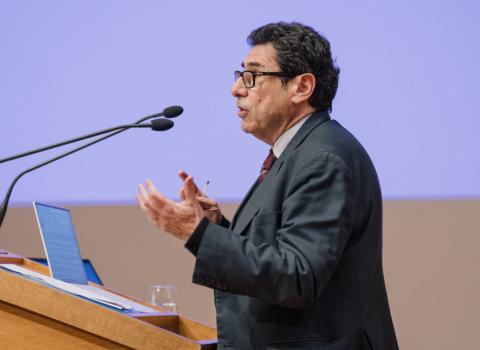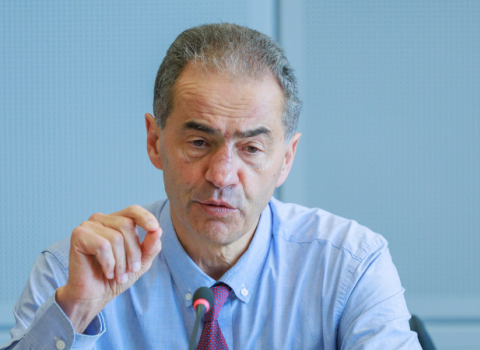Amid the 10th birthday celebrations, ERC president Jean-Pierre Bourguignon set down a marker for the future, suggesting the annual budget should rise to €4 billion over the next ten years.
The European Research Council (ERC) annual budget should reach €4 billion per annum by the time of the agency’s 20th anniversary in 2027, Jean-Pierre Bourguignon, ERC president said at its 10th birthday party this week.
The 2017 budget of €1.8 billion is due to increase to €2.2 billion by the time Horizon 2020 ends. “Obviously I’m aware that there will always be uncertainties with future budgets but I’m saying we should take €4 billion as our reference point,” Bourguignon told Science|Business. “The idea is that this should keep increasing by between €200 and €300 million each year during the next framework programme.”
Bourguignon could not have picked a better moment to make his pitch, standing next to a big cake commemorating a successful first decade and in front of an audience gathered to toast the council’s fine run.
Since its foundation, ERC has funded almost 7,000 projects, several of which have paved the way for major new breakthroughs. “We have delivered,” said Robert-Jan Smits, the European Commission’s director‐general for research.
The plaudits came from far and wide, with Krishnaswamy VijayRaghavan, secretary of the department of biotechnology in India, saying, “Every funding agency in the world wants to emulate the ERC,” in a message beamed via video link.
EU Commission President Jean-Claude Juncker, who does not talk as often about research as his predecessor, also appeared on screen to say the ERC, ‘’had created a legacy that will last for generations.”
The first ERC competition, back in 2007, received 9,167 applications, about three times more than the average submission rate for EU research calls.
Among the successful first-time applicants was Konstantin Novoselov, who would later clinch the 2010 Nobel prize in physics with Andre Geim, for their pioneering work on graphene.
Here was the making of the ERC, said Helga Nowotny, one of the council’s founding members and its president from 2010-2013. “You can only imagine how easily he could have lost out on a grant and how embarrassing it would have been for us,” she said.
“The Nobel Prize validated the whole thing,” agreed Pablo Amor, director of the ERC Executive Agency, the administrative wing of the council. ERC research has helped pave the way for a further five Nobel Prizes. “We’re always celebrating things at the ERC,” said Amor.
Looking forward
The eagerness with which scientists and policymakers embraced the ERC this week surely bodes well for the agency’s future. A budget ring fence would seem the least the ERC can expect, on the back of the outpouring of praise it received.
Given the laurels adorning the ERC, it seems churlish to contemplate changing a winning formula, but that is what some people are doing.
One issue to be raised in the future is the gender imbalance. Stefania Milan, assistant professor of new media and digital culture at the University of Amsterdam, and holder of an ERC grant, said she would like to see the ERC do more to help female grantees.
“I’m not asking for quotas,” she said. Rather, she wants the ERC to study an example that has been successful in the Netherlands, where research councils allocate a little extra money to departments to “buy the time” of female scientists so that they can write applications. “The ERC could act as a flywheel for other womens’ proposals,” Milan said.
There is also the familiar complaint that the biggest recipients of ERC grants remain the countries with the best-developed scientific infrastructures in the UK, Germany, France, the Nordics, Belgium, the Netherlands and Switzerland (a participant, even though not an EU member).
By contrast, researchers in several poorer countries have received virtually no grants. Pressure for the Commission to do something about this could conceivably grow in the future, depending on the outcomes of some key elections this year.
Meanwhile Bourguignon says he would like do something about the overall success rate. “We know they are not satisfactory. We feel we would be in a much more comfortable place if they were at 15 per cent.”
This year, the figure is 12.5 per cent; last year it was 11 per cent. A bigger slip in the future could cause problems. “Below 10 per cent is a psychological threshold — we know even excellent people may not apply if it goes below this level,” Bourguignon said.
But it seems unlikely there will be much motivation in Brussels to do radical furniture shifting at the ERC. “When you have a jewel in the crown you should not touch it,” said EU Research Commissioner Carlos Moedas.
The Commissioner’s main plea was for everyone to talk about the agency more. It did not escape attention in Brussels that NASA’s recent discovery of seven new planets beyond the solar system gave no prominent mention to the Belgian scientist Michaël Gillon, and the ERC money backing him.
While the Commission promised to push ERC results more enthusiastically in the future, its staff will be wary of pressures to let more people in on their success.
Officials are said to bristle at suggestions, predominantly coming out of Switzerland and the UK, that the ERC should open up space in its management to prominent European research foundations like the Wellcome Trust and the Volkswagen Stiftung.
The argument is that wealthy foundations will help provide long-term financial stability for the ERC, freeing it from having to worry about changing political tides and the delicate and mysterious art of EU budget talks.
“We have to watch the ERC die and be reborn every seven years. The political fight is a big distraction for everyone,” said one scientist, referring to the seven-year budget cycles in Brussels.
Switzerland, outside the EU, and the UK, soon to be outside the EU, have additional motivations for seeing ERC governance extend beyond Brussels, of course, but the option is interesting for scientists who value greater autonomy for the council.
The idea does not find much truck inside the Commission, however. “I’m open to work more with foundations,” said Moedas. “But I don’t see any management role for them. It’s our jewel.”





 A unique international forum for public research organisations and companies to connect their external engagement with strategic interests around their R&D system.
A unique international forum for public research organisations and companies to connect their external engagement with strategic interests around their R&D system.